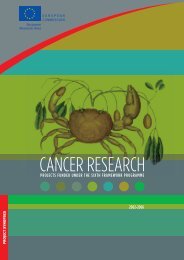I527-290 ESRIF Final Report (WEB).indd - European Commission
I527-290 ESRIF Final Report (WEB).indd - European Commission
I527-290 ESRIF Final Report (WEB).indd - European Commission
You also want an ePaper? Increase the reach of your titles
YUMPU automatically turns print PDFs into web optimized ePapers that Google loves.
Weight / Cost<br />
Estimate (small2-<br />
5€; med 10-25€;<br />
large 30-40€)<br />
Cluster Timeline<br />
(short-midlong-term)<br />
From WG What? Why? How? Key link<br />
elements<br />
running<br />
No.<br />
response forces<br />
> lessons<br />
learned analysis<br />
and exchange<br />
3.2; 3.3;<br />
short term small to med<br />
4<br />
> provide standardisation of rescuer identity, skills and<br />
credential to allow interoperable command and control<br />
cooperation for a more efficient international<br />
cooperation.<br />
> address the use of virtual live exercises and other<br />
simulation-supported training methods, in particular<br />
multi-hazards training simulators, the development of<br />
appropriate and sufficient methods and tools for<br />
structured ways of lessons learned analysis, exchange<br />
and integration into planning and training, and on the<br />
education side the development of international degree<br />
courses and standards for crisis management leaders<br />
aimed at excellence would be recommended.<br />
Research should<br />
> focus on new ways of offering information to the user.<br />
38 4 Situational awareness and<br />
decision making<br />
> The rapidly increasing amount of data available needs<br />
accurate compilation depending on processes, workflows<br />
and most important the individual needs of the user.<br />
Each person develops a very personal model to cope with<br />
information overflow. “One size fits all” will not be<br />
appropriate for future amounts of data.<br />
With the increasing amount of available<br />
information coming from more and more<br />
sophisticated sensor systems on the one hand<br />
and by means of information sharing with<br />
other organisations on the other research on<br />
crisis management processes and workflows<br />
together with human factor issues shall<br />
improve the effectiveness and efficiency of the<br />
crisis managers.<br />
small to med<br />
short to mid<br />
term<br />
5<br />
> human factors<br />
> process and<br />
workflow<br />
analysis<br />
> data<br />
integration,<br />
fusion,<br />
compilation<br />
> information<br />
interpretation<br />
> display<br />
technologies<br />
> management<br />
theory and<br />
concepts<br />
> systemic<br />
analyses<br />
> NEC<br />
3.14;<br />
Research should support the process of adaptation of<br />
these concepts to the new challenges two-fold:<br />
> on the one hand, modern management concepts and<br />
tools and their possible use for innovating crisis<br />
management concepts should be assessed, understood<br />
and exploited (e.g. adaptive complexity management),<br />
and ultimately a comprehensive, integrative, general<br />
conceptual, theoretical framework for adaptive crisis<br />
management should be developed.<br />
> On the other hand, novel system of systems<br />
approaches like the NEC (network enabling capabilities)<br />
concept should be analysed for civil security applications<br />
and related capabilities should be developed.<br />
The idea of innovative concepts is that the<br />
changing security environment with its<br />
inherent uncertainties and emerging new<br />
challenges for security forces require not only<br />
improved strategic planning capabilities, but<br />
also continuous reviewing of current crisis<br />
management concepts.<br />
39 4 Innovative management/<br />
organisational concepts<br />
263

















